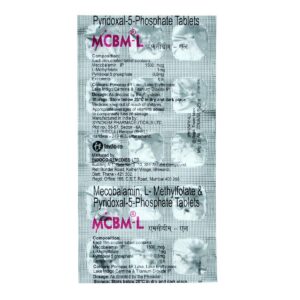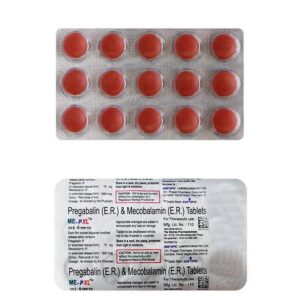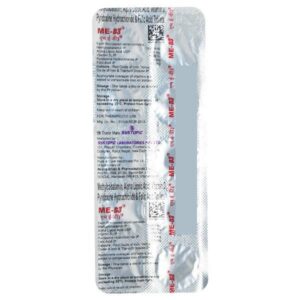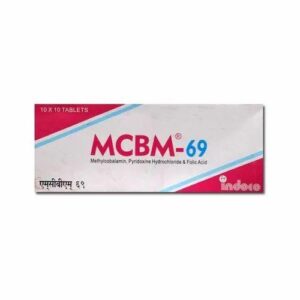FOLIC ACID + PYRIDOXINE (VITAMIN B6) + MECOBALAMIN
Folic Acid: Folic acid, also known as vitamin B9, is a water-soluble vitamin that plays a vital role in various bodily functions. It is commonly prescribed as a dietary supplement or medication to treat or prevent folic acid deficiency.
Folic acid is essential for the production of red blood cells and DNA synthesis. It also helps in preventing certain birth defects of the baby’s brain and spine when taken by pregnant women. Additionally, it aids in the proper functioning of the nervous system and supports healthy cell division and growth.
The recommended dose of folic acid varies depending on age, sex, and specific health conditions. The typical daily dose for adults is 400-800 micrograms (mcg), while pregnant women are usually advised to take 600-800 mcg daily. The dosage requirements for children are typically lower, ranging from 150-400 mcg per day.
Most people can tolerate folic acid supplements well with limited side effects. However, in some cases, higher doses of folic acid can cause mild side effects such as nausea, abdominal cramps, diarrhea, and sleep disturbances. These side effects are rare and usually resolve on their own.
It is worth noting that folic acid supplements can interact with certain medications, such as methotrexate, which is used to treat cancer and autoimmune conditions. Methotrexate blocks the action of folic acid and hence, increasing the dose of folic acid while taking methotrexate may reduce its effectiveness.
It is always advisable to consult a healthcare professional before starting any new medication or supplement, including folic acid, to ensure proper dosing and to discuss potential interactions or contraindications based on individual health needs.
Pyridoxine (vitamin B6): Drug: Pyridoxine (Vitamin B6)
Use: Pyridoxine is a water-soluble vitamin that is used as a dietary supplement to treat or prevent vitamin B6 deficiency. It is also used as an adjuvant therapy for some medical conditions, such as certain types of anemia, cognitive disorders, and certain types of seizures.
Mechanism of Action: Pyridoxine is essential for the proper functioning of various enzymes involved in the metabolism of proteins, carbohydrates, and fats. It is converted in the body to its active form, pyridoxal phosphate (PLP), which acts as a coenzyme for these enzymes. PLP is mainly involved in the synthesis of neurotransmitters such as serotonin, dopamine, and norepinephrine, which play a crucial role in the transmission of nerve impulses.
Dose: The recommended daily dose of pyridoxine depends on age, sex, and specific health conditions. The typical adult dose ranges from 1.3 to 2.0 mg per day. However, higher doses may be required for certain medical conditions under the supervision of a healthcare professional.
Side Effects: Pyridoxine is generally considered safe when taken in recommended doses. However, high-dose supplementation (above 200 mg per day) can cause a condition called sensory neuropathy, which can result in numbness, tingling, and nerve damage. Other potential side effects of excessive pyridoxine intake include headache, nausea, vomiting, stomach pain, photosensitivity, and sleep disturbances. High doses of pyridoxine can also interfere with the absorption and effectiveness of other medications.
It is important to consult with a healthcare professional before starting pyridoxine supplementation, especially if you have any underlying medical conditions or are taking other medications. They can provide you with personalized dosage recommendations and monitor your progress to ensure safe and effective use of pyridoxine.
Mecobalamin: Mecobalamin is a form of vitamin B12 that is used to treat vitamin B12 deficiency. It is an essential vitamin for the proper functioning of the nervous system and the production of red blood cells. Mecobalamin is commonly prescribed to individuals with pernicious anemia, as well as those with conditions such as diabetic neuropathy, nerve damage caused by alcoholism, and certain forms of nerve pain.
The mechanism of action of Mecobalamin involves its conversion into methylcobalamin, which is an active form of vitamin B12. Methylcobalamin plays a vital role in the methylation process, where it participates in the transfer of methyl groups to various substrates. This process is crucial for the synthesis of DNA, RNA, proteins, and myelin, which protects nerve fibers.
The usual recommended dose of Mecobalamin for adults is 1-2 mg daily, either orally or as an injection, depending on the severity of the deficiency. The treatment duration can vary depending on the individual’s condition and response to therapy. It is important to follow the prescribed dosage and duration as advised by a healthcare professional.
Common side effects of Mecobalamin are usually mild and temporary. These can include diarrhea, nausea, headache, dizziness, and skin rash. In rare cases, allergic reactions or respiratory distress may occur, which require immediate medical attention. It is advisable to inform a healthcare professional if any troubling side effects are experienced.
Mecobalamin is generally considered safe for most individuals when used as directed. However, it may interact with certain medications, such as those used to lower cholesterol or anticonvulsants, so it is important to inform the prescribing doctor about all medications being taken. Mecobalamin is not recommended for individuals with Leber’s disease or cobalt allergies.
Overall, Mecobalamin is an essential vitamin B12 supplement used to treat vitamin B12 deficiency and associated conditions. It is important to consult a healthcare professional for proper diagnosis and guidance regarding its use.






